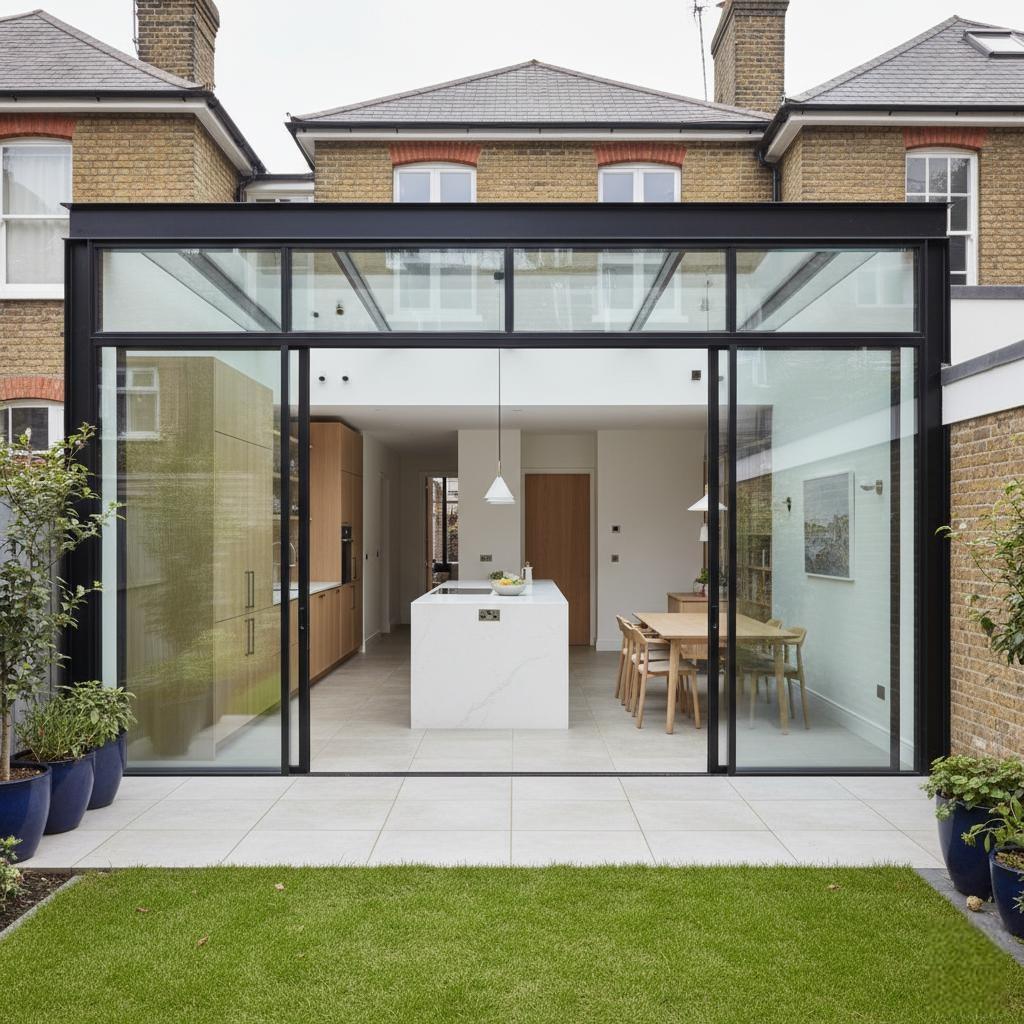
Structural Engineering for Home Extensions (UK Guide 2026)
Home extension structural design forms the technical backbone of your project, ensuring the new build is stable, safe and fully compliant with UK Building Regulations. This guide explains exactly what we do without the complex jargon.
What Is Structural Design?
Structural design involves calculating the forces acting on your building—such as the weight of the roof, floors and new walls—and specifying the correct materials to support them safely. Whether you are planning a simple kitchen addition or a large wrap-around extension, the engineering drawings tell your builder exactly what steel beams, timber joists and concrete foundations to use.
While an architect focuses on the layout and aesthetics, a structural engineer ensures the building stands up. We produce the specific calculations and structural plans that Building Control inspectors require before your project can be signed off.
In simple terms: the architect designs how it looks; we design how it works.
Why You Need an Engineer for Your Extension
Passing Building Control
To legally build an extension, you must prove it is stable. Your Local Authority or private inspector will demand structural calculations for foundations, roof structures and steel beams. See our Building Control guide for more detail. Without these documents, you cannot get a Completion Certificate.
Sizing Steel Beams (RSJs)
If you are removing walls to create an open-plan living space or installing bi-fold doors, you will need steel beams. We calculate the exact size required (e.g., a 203 UB 46) to carry the loads from above without sagging or causing cracks.
Managing Load Paths
A "load path" is simply the route weight takes to get to the ground.
- When you remove a load bearing wall, you interrupt this path.
- We design new beams and posts to redirect this weight safely into the foundations.
- This prevents floors from dropping and masonry from cracking.
Assessing Wall Removal
Not all walls carry weight, but many do. We assess the direction of floor joists and the roof structure to determine which walls are supporting the house and which are merely partitions. This confirms if you need a heavy steel frame or just a simple lintel.
Home Extension Structural Design Elements
Foundations
The ground must be able to support the new extension. We specify the depth and width of concrete footings based on:
- Soil type (e.g., clay, sand or chalk)
- Proximity to trees (which can dry out soil)
- Existing drainage runs
- Total weight of the new build
Common solutions include strip footings, trench fill, or piled foundations for difficult ground.
Walls and Masonry
We specify the strength of blocks and mortar required to ensure your walls can withstand wind loading and the weight of upper floors. This often involves checking the stability of existing walls where they join the new structure.
Steel Beams and Columns
Steel is the standard solution for bridging large openings. We specify the section size and connection details. Typical UK beam sizes we use include:
- 152 x 89 UB
- 203 x 102 UB
- 254 x 146 UB
- 305 x 165 UB
Correct steel beam design ensures deflection is kept to a minimum so your plaster doesn't crack.
Roof Structure
Whether you have a flat roof with skylights or a pitched tiled roof, the timbers must be sized correctly. We calculate rafter depths, ridge beam sizes and joist spacing to handle snow loads and the weight of tiles or slate.
Padstones
A padstone is a dense concrete block that sits under the end of a steel beam. It spreads the concentrated load into the brickwork below, preventing the masonry from crushing under the weight.
The Engineering Process
Step 1 – Site Survey
We measure the existing building to understand dimensions, wall thicknesses and the layout of the current structure.
Step 2 – Load Analysis
We calculate the "dead loads" (materials) and "live loads" (people and furniture) that the extension must support.
Step 3 – Calculation Phase
We use structural software and manual checks to size the steel beams, timber joists and column supports. These calculations are prepared for Building Control.
Step 4 – Foundation Check
We assess local ground conditions to determine the safe depth for your new foundations.
Step 5 – Regulatory Submission
We provide a structural pack for your builder and the inspector. You should always check the Planning Portal for current compliance rules.
Common Structural Issues
Undersized Steel
Using a beam that is too small leads to "bouncy" floors and cracked ceilings. Rectifying this after the build is finished is extremely expensive.
Lack of Wind Bracing
Extensions with large glass doors have very little solid wall to keep them rigid. We often design steel wind posts or portal frames to stop the structure from swaying in high winds.
Shallow Foundations
Digging foundations too shallow, especially in clay soil, risks movement during dry summers. This causes subsidence cracks.
Overloading Old Lintels
Placing new heavy loads onto existing window heads or weak walls can cause collapse. We check the existing structure to ensure it can take the extra weight.
Structural Engineer Fees (2026 Guide)
Single Beam Calculation
Typically between £250 and £500, depending on complexity.
Full Extension Design
For a complete rear or side extension, fees usually range from £450 to £1,200. This covers the full calculations package.
Foundation Design
Often included in the full pack, or £200–£350 if required separately.
Additional Costs to Consider
- Party Wall Awards
- Trial pits (digging to check soil type)
- Thames Water build-over agreements
- Specialist site visits
Mistakes to Avoid (Engineer’s View)
Guessing Beam Sizes
Never let a builder "guesstimate" a steel size based on previous jobs. Every house is different, and this invalidates your insurance.
Insufficient Bearing
Steel beams usually need at least 100mm to 150mm of solid support at each end. Builders sometimes cut this short, risking masonry failure.
Notching Joists Incorrectly
Cutting deep notches into floor joists for pipes or wires weakens them significantly. There are strict rules on where you can cut.
Ignoring Padstones
Resting a steel beam directly on standard brickwork is dangerous. Padstones are essential for distributing the load safely.
Frequently Asked Questions
Is a calculation mandatory?
Yes. For any structural alteration, Building Control requires calculations to prove safety.
How fast is the process?
We typically turn around standard home extension calculations in 3 to 5 working days.
What if the inspector objects?
If Building Control has queries, we answer them and adjust the design if necessary until it is approved.
Can I remove a chimney breast?
Yes, but the remaining chimney stack above must be supported by gallows brackets or steel beams to prevent it from falling.
Final Summary
Getting the structure right is the most critical part of your extension. It ensures safety, compliance and long-term value. With a clear structural plan, you avoid on-site delays and unexpected costs. We provide practical, buildable designs that keep your project moving.
If you need structural calculations for your extension, contact us today for a fixed quote.

